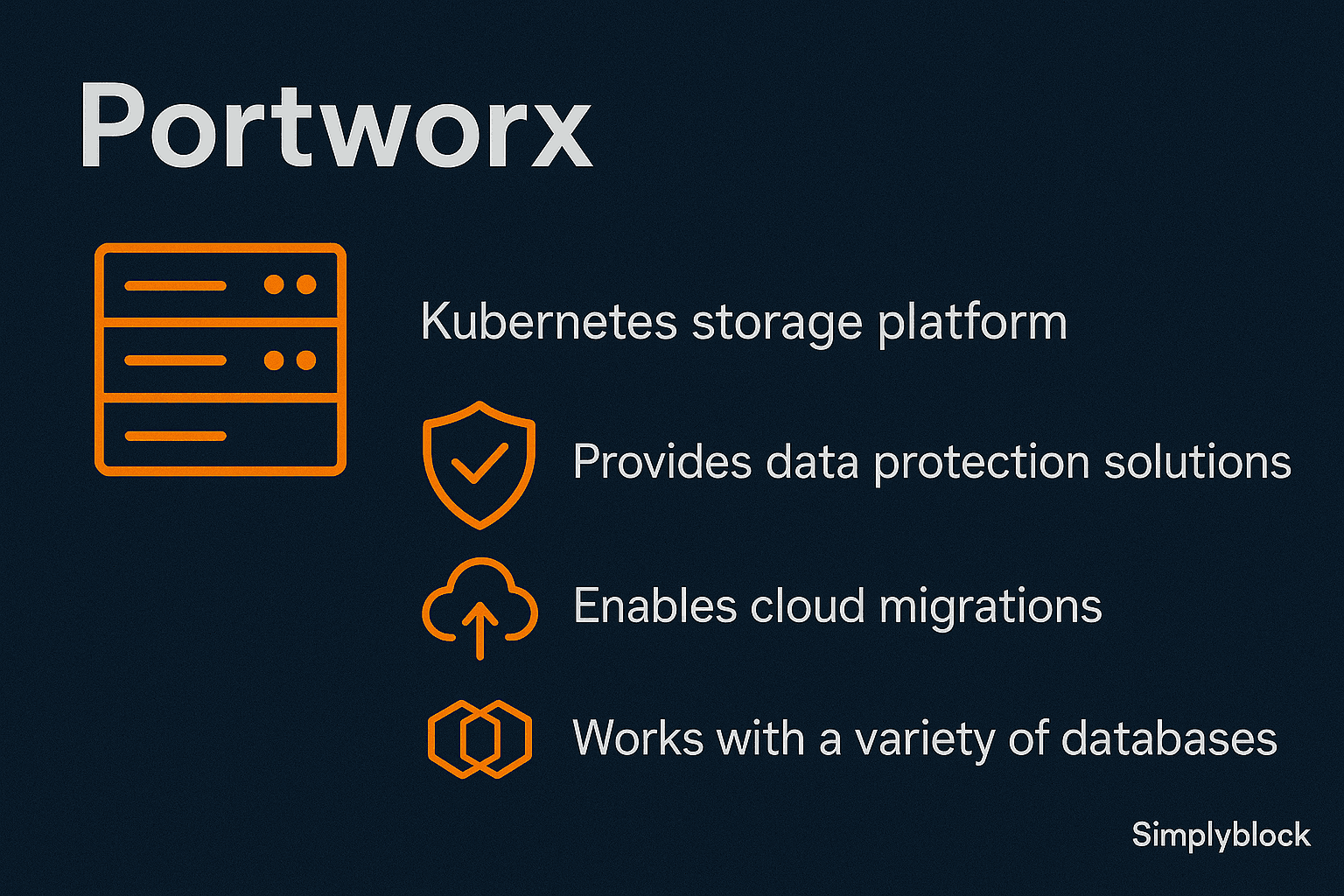Portworx
Terms related to simplyblock
Portworx is a cloud-native storage platform designed specifically for containerized applications running in Kubernetes. It provides persistent block, file, and object storage services, along with high availability, backup, disaster recovery, and data security. Portworx is often used by DevOps and platform engineering teams to run stateful workloads like databases, message queues, and AI pipelines in production Kubernetes environments.
Originally developed by Portworx Inc. and later acquired by Pure Storage, Portworx has become one of the most widely adopted Kubernetes storage orchestration platforms in enterprise environments.

How Does Portworx Work?
Portworx runs as a container-based storage layer directly on Kubernetes worker nodes. It aggregates local or cloud-attached storage into a unified storage pool and exposes persistent volumes via Kubernetes CSI.
The platform supports a range of advanced features, including synchronous replication, volume snapshots, encryption, and data mobility across clusters or availability zones. It integrates with multiple storage backends, cloud providers, and orchestration tools, allowing platform teams to standardize stateful storage across their Kubernetes fleets.
Simplyblock’s Kubernetes-native SDS follows a similar model but uses a distributed NVMe-over-TCP architecture for higher throughput and simplified scalability. If you want to learn more about choice right storage in context of Kubernetes, read our blog post comparing disaggregated and hyper-converged storage for Kubernetes.
Key Features
Portworx offers a robust set of features tailored for enterprise-grade Kubernetes deployments:
- Container-native block storage with CSI support
- Synchronous replication for high availability
- Built-in volume encryption and access controls
- Application-aware backup and disaster recovery
- Multi-cloud and hybrid-cloud support
- Tiered storage support across disks, SSDs, and cloud volumes
- Kubernetes-integrated snapshots and volume cloning
- Policy-based provisioning and QoS enforcement
Portworx’s value lies in its ability to standardize and automate stateful storage operations across multiple clusters, regions, and clouds. In similar fashion, Simplyblock supports snapshot automation and volume-level cloning built into its distributed storage fabric.
Portworx vs Simplyblock
Portworx offers a feature-rich Kubernetes storage platform focused on container-native workloads. Simplyblock provides a next-generation alternative using NVMe-over-TCP and a fully distributed, erasure-coded architecture.
| Feature | Portworx | Simplyblock |
|---|---|---|
| Storage Architecture | Node-attached, centralized control | Distributed NVMe-over-TCP |
| Data Protection | Replication + backup policies | Erasure coding with fault tolerance |
| Kubernetes Support | CSI, extensive CRDs | Kubernetes-native CSI with snapshots |
| Storage Media | Any disk/volume | NVMe-focused SDS |
| Edge & Hybrid Support | Yes, with configuration | Built-in support for edge and hybrid setups |
| Performance Optimization | Varies by backend | Optimized for NVMe/TCP, low-latency |
Looking for an Alternative?
Portworx is a strong choice for enterprises needing container-native storage for Kubernetes. However, Simplyblock™ offers a modern alternative that is designed for performance, efficiency, and simplicity.
Unlike replication-heavy architectures, Simplyblock uses erasure coding to reduce storage overhead while maintaining fault tolerance. It is built on a distributed architecture with native NVMe-over-TCP support, delivering high throughput and consistent latency for IOPS-intensive workloads.
Simplyblock supports hybrid, edge, and air-gapped environments, offers instant snapshot and clone functionality, and integrates natively with Kubernetes using CSI — all without requiring vendor-specific agents or sidecars.
If you’re looking to simplify your Kubernetes storage architecture while improving cost and performance, Simplyblock is a high-performance alternative to Portworx.
Related resources for deeper insight:
- Distributed Storage Systems
- NVMe over TCP vs iSCSI
- Performance Benchmarks vs Ceph
- Edge and Air-Gapped Storage
External Resources
- Portworx Official Website
- Kubernetes CSI Documentation
- Pure Storage Acquires Portworx
- Cloud-Native Storage – CNCF Landscape
- Stateful Workloads in Kubernetes – Kubernetes Docs
Questions and Answers
Portworx is a Kubernetes-native storage platform designed for stateful workloads. It offers dynamic provisioning, volume encryption, replication, and disaster recovery, making it ideal for enterprises needing high availability and resilience in Kubernetes environments.
Yes, Portworx can integrate with fast storage devices like NVMe. For latency-sensitive applications, pairing it with NVMe over TCP delivers the performance needed for high-throughput workloads in containerized environments.
Portworx offers a robust enterprise feature set, including multi-cloud support and volume snapshots. However, software-defined storage platforms like Simplyblock offer lightweight, open alternatives with a stronger focus on performance, simplicity, and multi-tenant encryption.
Yes, Portworx includes native encryption at rest with external key management integration. For environments with strict compliance needs, pairing it with volume-level encryption ensures secure data isolation and stronger access control.
Absolutely. Portworx is built to scale across thousands of nodes and volumes in production. For best results, it should be deployed on high-performance NVMe storage to eliminate I/O bottlenecks in large-scale Kubernetes clusters.
